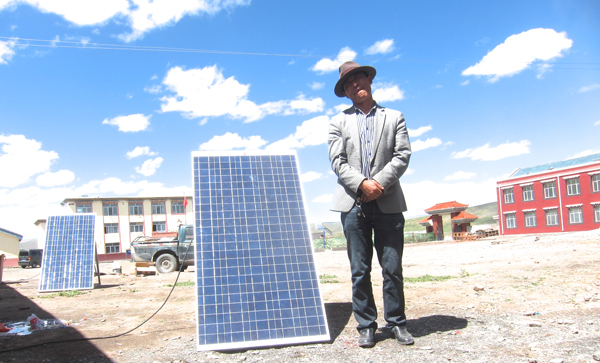Illuminating the future
China Daily, May 5, 2014 Adjust font size:
| Qumahe Primary School principal Youngdingqupai stands next to the solar panels that have transformed education on the campus in the isolated community of Tibetan nomads in Qinghai province's Yushu prefecture. [Photo by Erik Nilsson / China Daily] |
The school also offers food, clothes and free tuition, easing households' burdens. And it provides not only pedagogical but also moral education.
Those visits changed parents' minds.
Qumahe's enrollment is now 100 percent, Youngdingqupai says.
But many children are years beyond their grades' average age since they started late. Three 16-year-olds are in fifth grade.
The town's 17-year-olds who didn't go to school are considered too old to start primary school. They may be Qumahe's last uneducated inhabitants.
"Parents don't ask much," Youngdingqupai says.
"Mostly, they don't want their children to follow them. They want their kids to be literate."
Qumahe's children are - in both their local language and in increasingly proficient Chinese.
"Most locals don't get the crucial caterpillar fungus income like nearby towns because it doesn't grow well here," Youngdingqupai says.
"They live on dairy, meat and pelts. But the pastures here aren't good. Half are sand."
Such tough terrain has cultivated herders' hopes for their children.
But while educationally light years ahead of their parents, Qumahe's kids are perhaps equally behind urban peers, even those in lower-tier cities.
Such is the time warp of education throughout Qumalai and comparably isolated herding communities. They're jetting into the future compared to their hometowns a few years ago yet lag behind where big city students were many years ago.
One area where the school has long lagged behind has been computer availability. Most people didn't know what one was until recently.
But a new setback is Qumahe's teacher shortage - recently rampant countywide, even as infrastructure improves.
"We need teachers who know modern education," Youngdingqupai says.
"But we don't have the conditions to attract or retain them. We need at least 14 teachers but have only eight."
Instructors earn 500 to 6,000 yuan. Meager salaries make it challenging to attract and retain instructors.



